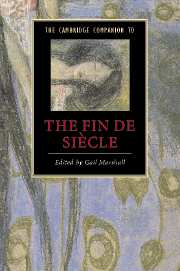Book contents
- Frontmatter
- Introduction
- 1 Psychology at the fin de siècle
- 2 Decadence and aestheticism
- 3 Sexual identity at the fin de siècle
- 4 Socialism and radicalism
- 5 Empire
- 6 Publishing industries and practices
- 7 The visual arts
- 8 The New Woman and feminist fictions
- 9 Realism
- 10 The fantastic fiction of the fin de siècle
- 11 Varieties of performance at the turn of the century
- 12 Poetry
- Guide to further reading
- Index
- Series List
9 - Realism
Published online by Cambridge University Press: 28 September 2008
- Frontmatter
- Introduction
- 1 Psychology at the fin de siècle
- 2 Decadence and aestheticism
- 3 Sexual identity at the fin de siècle
- 4 Socialism and radicalism
- 5 Empire
- 6 Publishing industries and practices
- 7 The visual arts
- 8 The New Woman and feminist fictions
- 9 Realism
- 10 The fantastic fiction of the fin de siècle
- 11 Varieties of performance at the turn of the century
- 12 Poetry
- Guide to further reading
- Index
- Series List
Summary
Casting his practised eye over the English literary scene in 1884, Henry James was heartened to see signs of a new interest - new for England, at any rate - in the theory of the novel. 'Only a short time ago', James writes in 'The Art of Fiction', 'it might have been supposed that the English novel was not what the French call discutable': not, that is, an appropriate topic for debate or even moderately impassioned conversation. The novel in Victorian Britain had in James's view become a highly sophisticated art form, yet there was still among British readers 'a comfortable, good-humoured feeling abroad that a novel is a novel, as a pudding is a pudding, and our only business with it could be to swallow it' (p. 44). Now such mindless ingestion was becoming less common. We have learned to increase our readerly pleasures, James maintains, precisely by stepping back to contemplate them critically. 'The successful application of any art is a delightful spectacle, but the theory too is interesting' (p. 45) - especially at moments of creative ferment such as the 1880s, when theory and application alike were in productive turmoil. Casting aside outworn conventions, modern writers were in James's view developing new techniques for achieving the novel's only abiding goal: to 'represent life' through an ever-renewed engagement with 'reality' (p. 46). For James in 1884, the progress of literary realism was more or less coterminous with the advance of narrative fiction as a whole. Surveying the contemporary literary landscape, he found much to be encouraged by, not least in the new self-consciousness with which writers and readers of novels practised their respective tasks. 'The Art of Fiction' makes an urgent case for the 'fertilising' effect on the novel of 'discussion', of 'experiment', of 'curiosity', of 'variety of attempt', of a perpetual 'exchange of views and . . . comparison of standpoints'. As James reminds his readers, 'Art lives upon discussion' (pp. 44-5).
- Type
- Chapter
- Information
- The Cambridge Companion to the Fin de Siècle , pp. 169 - 188Publisher: Cambridge University PressPrint publication year: 2007
- 9
- Cited by



